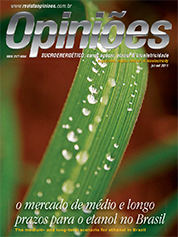Maurílio Biagi Filho
President of Maubisa
Op-AA-29
Good morning, ethanol
Ethanol’s current phase, from a marketing standpoint, could not be any better. First, because domestic demand is higher than the sugarcane agro-industry’s production capacity, thus maintaining prices stable. Second, because on the international front, there are clear signs that the market will open for our alternative fuel.
However, we need not celebrate because commercial success is not the whole story. Politically, for example, it is quite a bad time. The high price of sugarcane-based products causes some inflationary pressure in a difficult moment. As to going international, the bad news is that we lack production to meet the demand of this fantastic new market.
In light of all this, one may ask what good did it do that the sugarcane-based industry grew continuously in the course of the last thirty years. One could argue that we contributed to attenuate the fuel supply crisis, since nowadays the sugarcane crop stands for 16% of Brazil’s energy matrix, eight times more than at the time of the “Proálcool” program in 1975.
And yet, even if the balance of this development were positive, we need to look ahead and acknowledge that the only way out of the current impasse is to invest in the increase of production, as was done in the last decade, when the expansion of the ethanol chain surpassed the growth of any other agricultural area.
It was such an extraordinary success that it made Brazil showcase ethanol as proof of our ability to offer solutions for the environmental and energy crises. For the most part of the eight years of his government, president Lula used the glamour of ethanol in favor of the Brazilian image abroad. This was good for everybody because the atmosphere changed.
Riding on the wave of large investments in agricultural and industrial expansion, the industry came out exhausted from the 2008 crisis, with many mills having changed ownership and passing to the control of multinational groups. We have reached a fortunate moment in which the industry enjoys production stability but lacks funds to make the leap forward that is of interest to the country.
One of the sequels of the crisis is that in both the public opinion and in areas within government the idea that the sugarcane-based energy industry does not merit receiving a differentiated treatment because it it not reliable, has found a foothold.
It makes no sense to discuss whether this vision is fair or reasonable. Whether we like it or not, the image is not a favorable one. We must acknowledge it is an old problem. More than 50 years later, we are still reaping the benefits of our pride. On account of unresolved dissidences, to this day, many parties of the sugarcane agro-industry cultivate feelings of mutual distrust, resulting in the low level of representativeness that characterizes us.
Fragmentation of leadership is one of the marks of the sugarcane-based energy industry. Albeit a modern entity, well managed by Marcos Jank, the Brazilian Sugarcane Association (Unica) has a low adhesion rate among the industry’s business leaders.
Unfortunately, ego disputes result in that a single individual is not acknowledged as the speaker of the industry, whose biggest internal contradiction paradoxically is to decide what to do with sugarcane juice – whether to produce more sugar or more ethanol. Even more regrettable is the case of CTC - Sugarcane Technology Center, a technical icon supported by few for the benefit of all.
Since 2008 we knew that we would not have ethanol to support double demand - domestic and international – for ethanol, but we did not resist the offer of president Lula, whereby we would have enough clout to, at the same time, promote the national championship and the world cup of renewable fuels.
Even worse, we made the mistake of paying more attention to Washington than Brasília. It does not matter if this resulted from imprudence, naivety or irresponsibility; important is that we need to adopt a less immediate posture. A down-to-earth attitude, cool head, eyes set on the long-term: to come out of this mess, the industry needs long-term funding, at adequate rates to sustain investments typical for infrastructure.
The way out is not industry-based, but global. Therein lies an energy policy problem that should have been resolved a long time ago. It consists of the fact that the price setting of gasoline limits ethanol. For the sake of the future, it would be good if the relation ethanol-gasoline were resolved as soon as possible.
If we want to warrant the future of biomass as a source of energy, we need to not only increase production, but set-up partnerships with the business community of other countries, taking the necessary precautions to correctly assess existing opportunities, given that the international agricultural commodity market is prone to major distortions.




